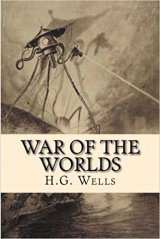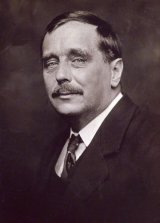The War of the Worlds Page #5
The War of the Worlds is a science fiction novel by English author H. G. Wells first serialised in 1897 by Pearson's Magazine in the UK and by Cosmopolitan magazine in the US.
A sudden chill came over me. There was a loud shriek from a woman behind. I half turned, keeping my eyes fixed upon the cylinder still, from which other tentacles were now projecting, and began pushing my way back from the edge of the pit. I saw astonishment giving place to horror on the faces of the people about me. I heard inarticulate exclamations on all sides. There was a general movement backwards. I saw the shopman struggling still on the edge of the pit. I found myself alone, and saw the people on the other side of the pit running off, Stent among them. I looked again at the cylinder, and ungovernable terror gripped me. I stood petrified and staring. A big greyish rounded bulk, the size, perhaps, of a bear, was rising slowly and painfully out of the cylinder. As it bulged up and caught the light, it glistened like wet leather. Two large dark-coloured eyes were regarding me steadfastly. The mass that framed them, the head of the thing, was rounded, and had, one might say, a face. There was a mouth under the eyes, the lipless brim of which quivered and panted, and dropped saliva. The whole creature heaved and pulsated convulsively. A lank tentacular appendage gripped the edge of the cylinder, another swayed in the air. Those who have never seen a living Martian can scarcely imagine the strange horror of its appearance. The peculiar V-shaped mouth with its pointed upper lip, the absence of brow ridges, the absence of a chin beneath the wedgelike lower lip, the incessant quivering of this mouth, the Gorgon groups of tentacles, the tumultuous breathing of the lungs in a strange atmosphere, the evident heaviness and painfulness of movement due to the greater gravitational energy of the earth--above all, the extraordinary intensity of the immense eyes--were at once vital, intense, inhuman, crippled and monstrous. There was something fungoid in the oily brown skin, something in the clumsy deliberation of the tedious movements unspeakably nasty. Even at this first encounter, this first glimpse, I was overcome with disgust and dread. Suddenly the monster vanished. It had toppled over the brim of the cylinder and fallen into the pit, with a thud like the fall of a great mass of leather. I heard it give a peculiar thick cry, and forthwith another of these creatures appeared darkly in the deep shadow of the aperture. I turned and, running madly, made for the first group of trees, perhaps a hundred yards away; but I ran slantingly and stumbling, for I could not avert my face from these things. There, among some young pine trees and furze bushes, I stopped, panting, and waited further developments. The common round the sand pits was dotted with people, standing like myself in a half-fascinated terror, staring at these creatures, or rather at the heaped gravel at the edge of the pit in which they lay. And then, with a renewed horror, I saw a round, black object bobbing up and down on the edge of the pit. It was the head of the shopman who had fallen in, but showing as a little black object against the hot western sun. Now he got his shoulder and knee up, and again he seemed to slip back until only his head was visible. Suddenly he vanished, and I could have fancied a faint shriek had reached me. I had a momentary impulse to go back and help him that my fears overruled. Everything was then quite invisible, hidden by the deep pit and the heap of sand that the fall of the cylinder had made. Anyone coming along the road from Chobham or Woking would have been amazed at the sight--a dwindling multitude of perhaps a hundred people or more standing in a great irregular circle, in ditches, behind bushes, behind gates and hedges, saying little to one another and that in short, excited shouts, and staring, staring hard at a few heaps of sand. The barrow of ginger beer stood, a queer derelict, black against the burning sky, and in the sand pits was a row of deserted vehicles with their horses feeding out of nosebags or pawing the ground. CHAPTER FIVE THE HEAT-RAY After the glimpse I had had of the Martians emerging from the cylinder in which they had come to the earth from their planet, a kind of fascination paralysed my actions. I remained standing knee-deep in the heather, staring at the mound that hid them. I was a battleground of fear and curiosity. I did not dare to go back towards the pit, but I felt a passionate longing to peer into it. I began walking, therefore, in a big curve, seeking some point of vantage and continually looking at the sand heaps that hid these new-comers to our earth. Once a leash of thin black whips, like the arms of an octopus, flashed across the sunset and was immediately withdrawn, and afterwards a thin rod rose up, joint by joint, bearing at its apex a circular disk that spun with a wobbling motion. What could be going on there? Most of the spectators had gathered in one or two groups--one a little crowd towards Woking, the other a knot of people in the direction of Chobham. Evidently they shared my mental conflict. There were few near me. One man I approached--he was, I perceived, a neighbour of mine, though I did not know his name--and accosted. But it was scarcely a time for articulate conversation. "What ugly brutes!" he said. "Good God! What ugly brutes!" He repeated this over and over again. "Did you see a man in the pit?" I said; but he made no answer to that. We became silent, and stood watching for a time side by side, deriving, I fancy, a certain comfort in one another's company. Then I shifted my position to a little knoll that gave me the advantage of a yard or more of elevation and when I looked for him presently he was walking towards Woking. The sunset faded to twilight before anything further happened. The crowd far away on the left, towards Woking, seemed to grow, and I heard now a faint murmur from it. The little knot of people towards Chobham dispersed. There was scarcely an intimation of movement from the pit. It was this, as much as anything, that gave people courage, and I suppose the new arrivals from Woking also helped to restore confidence. At any rate, as the dusk came on a slow, intermittent movement upon the sand pits began, a movement that seemed to gather force as the stillness of the evening about the cylinder remained unbroken. Vertical black figures in twos and threes would advance, stop, watch, and advance again, spreading out as they did so in a thin irregular crescent that promised to enclose the pit in its attenuated horns. I, too, on my side began to move towards the pit. Then I saw some cabmen and others had walked boldly into the sand pits, and heard the clatter of hoofs and the gride of wheels. I saw a lad trundling off the barrow of apples. And then, within thirty yards of the pit, advancing from the direction of Horsell, I noted a little black knot of men, the foremost of whom was waving a white flag.
Translation
Translate and read this book in other languages:
Select another language:
- - Select -
- 简体中文 (Chinese - Simplified)
- 繁體中文 (Chinese - Traditional)
- Español (Spanish)
- Esperanto (Esperanto)
- 日本語 (Japanese)
- Português (Portuguese)
- Deutsch (German)
- العربية (Arabic)
- Français (French)
- Русский (Russian)
- ಕನ್ನಡ (Kannada)
- 한국어 (Korean)
- עברית (Hebrew)
- Gaeilge (Irish)
- Українська (Ukrainian)
- اردو (Urdu)
- Magyar (Hungarian)
- मानक हिन्दी (Hindi)
- Indonesia (Indonesian)
- Italiano (Italian)
- தமிழ் (Tamil)
- Türkçe (Turkish)
- తెలుగు (Telugu)
- ภาษาไทย (Thai)
- Tiếng Việt (Vietnamese)
- Čeština (Czech)
- Polski (Polish)
- Bahasa Indonesia (Indonesian)
- Românește (Romanian)
- Nederlands (Dutch)
- Ελληνικά (Greek)
- Latinum (Latin)
- Svenska (Swedish)
- Dansk (Danish)
- Suomi (Finnish)
- فارسی (Persian)
- ייִדיש (Yiddish)
- հայերեն (Armenian)
- Norsk (Norwegian)
- English (English)
Citation
Use the citation below to add this book to your bibliography:
Style:MLAChicagoAPA
"The War of the Worlds Books." Literature.com. STANDS4 LLC, 2025. Web. 7 Jan. 2025. <https://www.literature.com/book/the_war_of_the_worlds_43>.




Discuss this The War of the Worlds book with the community:
Report Comment
We're doing our best to make sure our content is useful, accurate and safe.
If by any chance you spot an inappropriate comment while navigating through our website please use this form to let us know, and we'll take care of it shortly.
Attachment
You need to be logged in to favorite.
Log In